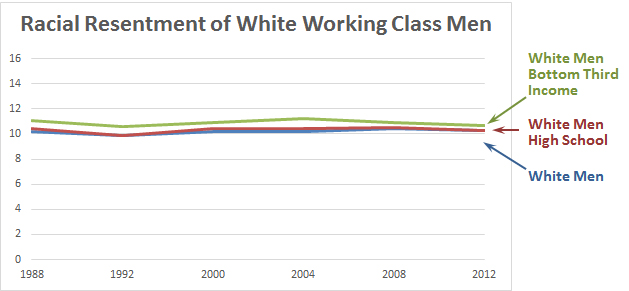I asked earlier for data about the racial attitudes of the white working class. There’s no foolproof way of determining this, but Phil Klinkner passes along the “racial resentment” scores of white working-class men from the American National Election Studies. This is on a scale of 0-16:

There are a few obvious things to take away from this:
- Racial resentment scores haven’t changed at all over the past 30 years.
- White men with only a high school education score exactly the same as white men overall.
- But white men with low incomes score a little higher.
If I were to draw any conclusions from this, I’d choose these two:
- Donald Trump is probably not drawing on anything new in the racial resentment department. He’s being louder and more obvious about it, but the pool of white racial resentment he’s working with just hasn’t changed much.1
- It’s low-income whites who score higher than whites overall, not those with low education. This suggests that economic status plays a (small) role in exacerbating racial resentment and that economic anxiety probably does play a (small) part in Donald Trump’s appeal to blue-collar whites.
This is just one bit of data, and I wouldn’t take too much from it. If I come across anything else that tells a different or more detailed story, I’ll pass it along.
1Sure, maybe it’s changed in just the past four years. I wouldn’t put a lot of money on that, though.

















